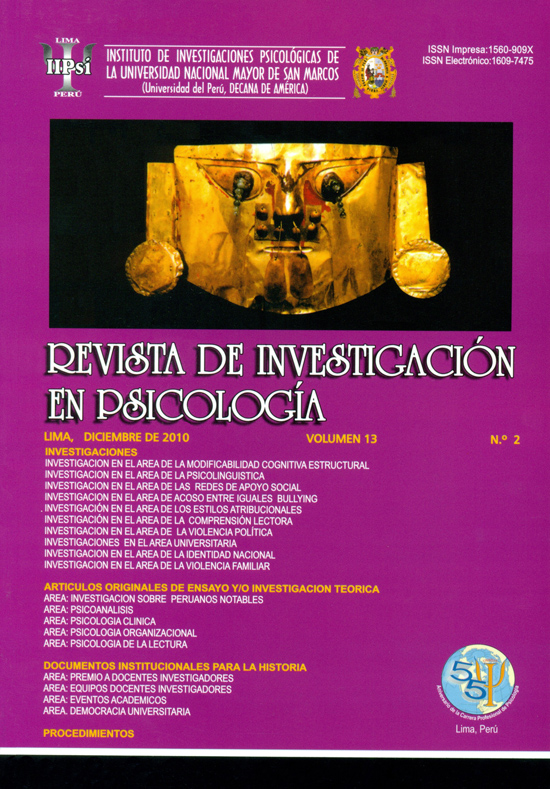Relationship between attributional style and learning styles with students in school of Lima Metropolitana
DOI:
https://doi.org/10.15381/rinvp.v13i2.3716Keywords:
attributional styles, learning styles, high school studentsAbstract
This study aimed to examine the relationship between attributional style and learning styles of high school students in Metropolitan Lima. We worked with 364 subjects aged 14 to 17 years, of both sexes, 4th and 5th grade of secondary education. Was applied Attributional Style Questionnaire proposed by Alonso (1991) and Alonso and Sánchez (1992) adapted by Matalinares (2009) and the Learning Styles Inventory of Kolb (1979) adapted by Drain (1991). The results showed a relation between attributional styles and learning styles. A significant relation between the areas that make up the experiential learning and attributional styles. There are differences between the attributional styles of men and women in the dimensions of attribution of academic success to ability and in the attribution of failure to lack of skill. Learning styles of men and women differ in the area of active experimentation. Finally, we found that there is a greater preference for allocation to successful relationships and a lower perception of the attribution of failure to the teacher. In the case of attributional styles in the area of interpersonal relationships, they present a preference for the Allocation of the success in interpersonal relations skill, and this is used to a lesser extent the belief of outsourcing failure.Downloads
Published
Issue
Section
License
Copyright (c) 2010 María Matalinares Calvet, Juan Yaringaño L., Lidia Sotelo L., Noemi Sotelo L., Carlos Arenas I., Gloria Díaz A., Alejandro Dioses C., Moira Encalada D., Rina Tipacti T., Milagros Bázan E., Yasmin Huari T.

This work is licensed under a Creative Commons Attribution-NonCommercial-ShareAlike 4.0 International License.
THE AUTHORS RETAIN THEIR RIGHTS:
a. The authors retain their trademark and patent rights, and also on any process or procedure described in the article.
b. The authors retain the right to share, copy, distribute, execute and publicly communicate the article published in the Journal of Research in Psychology (for example, place it in an institutional repository or publish it in a book), with acknowledgment of its initial publication in the Journal of Research in Psychology.
c. Authors retain the right to make a subsequent publication of their work, to use the article or any part of it (for example: a compilation of their work, lecture notes, thesis, or for a book), provided that they indicate the source. of publication (authors of the work, magazine, volume, number and date).






